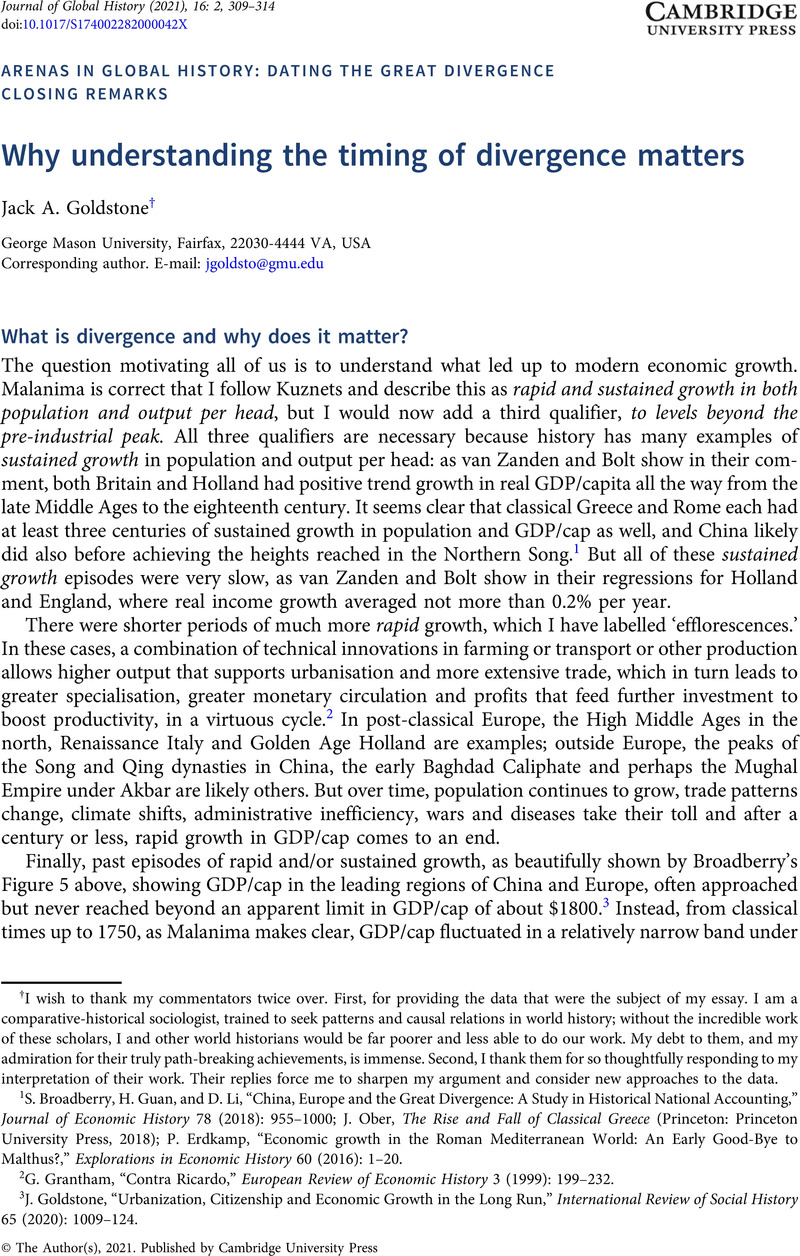Article contents
Why understanding the timing of divergence matters
Published online by Cambridge University Press: 23 June 2021
Abstract

Information
- Type
- Closing Remarks
- Information
- Copyright
- © The Author(s), 2021. Published by Cambridge University Press
Footnotes
I wish to thank my commentators twice over. First, for providing the data that were the subject of my essay. I am a comparative-historical sociologist, trained to seek patterns and causal relations in world history; without the incredible work of these scholars, I and other world historians would be far poorer and less able to do our work. My debt to them, and my admiration for their truly path-breaking achievements, is immense. Second, I thank them for so thoughtfully responding to my interpretation of their work. Their replies force me to sharpen my argument and consider new approaches to the data.
References
1 S. Broadberry, H. Guan, and D. Li, “China, Europe and the Great Divergence: A Study in Historical National Accounting,” Journal of Economic History 78 (2018): 955–1000; J. Ober, The Rise and Fall of Classical Greece (Princeton: Princeton University Press, 2018); P. Erdkamp, “Economic growth in the Roman Mediterranean World: An Early Good-Bye to Malthus?,” Explorations in Economic History 60 (2016): 1–20.
2 G. Grantham, “Contra Ricardo,” European Review of Economic History 3 (1999): 199–232.
3 J. Goldstone, “Urbanization, Citizenship and Economic Growth in the Long Run,” International Review of Social History 65 (2020): 1009–124.
4 J. Mokyr, A Culture of Growth: The Origins of the Modern Economy (2016); J. Goldstone, “Divergence in Cultural Trajectories: The Power of the Traditional within the Early Modern,” in Comparative Early Modernities 1100-1800, ed. David Porter (New York: Palgrave-Macmillan, 2012), 165–92.
5 S. Broadberry and J. Wallis, “Growing, Shrinking and Long Run Economic Performance: Historical Perspectives on Economic Development,” National Bureau of Economic Research Working Paper No. 23343, 2017, http://www.nber.org/papers/w23343.
6 J. Aberth, From the Brink of the Apocalypse: Confronting Famine, War, Plague and Death in the Later Middle Ages (London: Routledge, 2001).
7 S. Broadberry, B. Campbell, A. Klein, M. Overton, and B. van Leeuwen, British Economic Growth, 1270–1870 (Cambridge: Cambridge University Press, 2015).
8 C. Dyer, Making a Living in the Middle Ages: The People of Britain, 850–1520 (London: Yale University Press, 2009).
9 E. Burlingh, B. M. S. Campbell, A. Rijpma, and J. L. van Zanden, “Church Building and the Economy During Europe’s ‘Age of the Cathedrals’, 700–1500 CE,” Explorations in Economic History 76 (2020): 101316.
10 Burlingh, Campbell, Rijpma and van Zanden, “Church Building,” Figure 5.
11 Broadberry, Campbell, Klein, Overton, and van Leeuwen, British Economic Growth, 1270–1870 (Table 5.07).
12 A. De Pleijt and J. L. Van Zanden. A tale of two transitions: the European growth experience, 1270–1900. Maddison project Working Paper, WP 14, 2020.
13 Broadberry, Guan, and Li, “China, Europe,” 955–1000.
14 S. Broadberry and J. Wallis, “Growing, Shrinking and Long Run Economic Performance: Historical Perspectives on Economic Development,” National Bureau of Economic Research Working Paper No. 23343, 2017, http://www.nber.org/papers/w23343, p. 18.
15 J. L. van Zanden and B. van Leeuwen, “Persistent but not Consistent: The Growth of National Income in Holland, 1347–1807,” Explorations in Economic History 49 (2012): 119–130.
16 J. Goldstone, “The Problem of the ‘Early Modern’ World,” Journal of the Economic and Social History of the Orient 41 (1998): 249–84; K. Pomeranz, The Great Divergence: China, Europe, and the Making of the Modern World Economy (Princeton: Princeton University Press, 2000).
- 1
- Cited by


